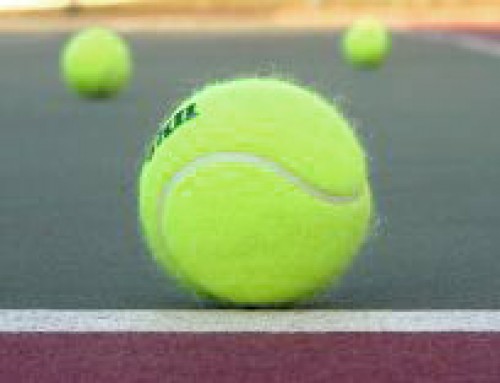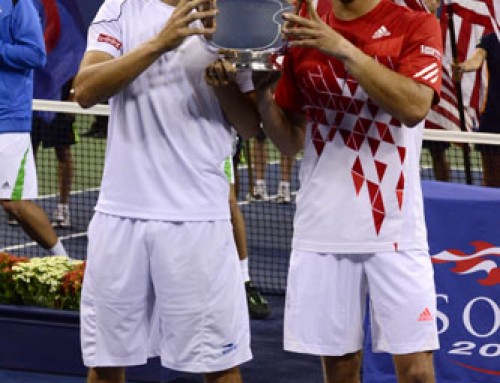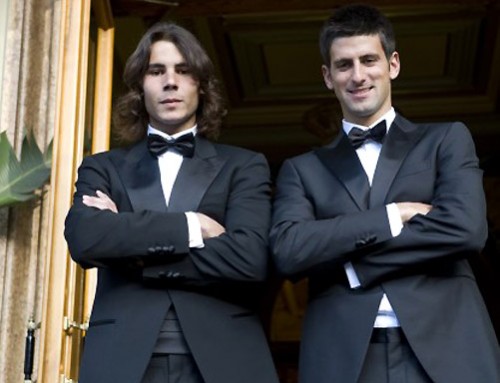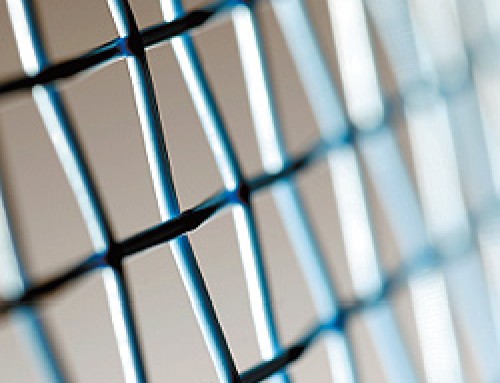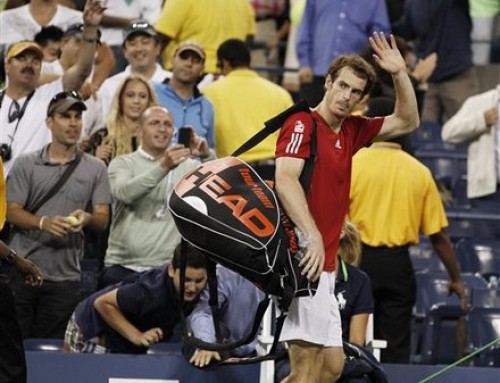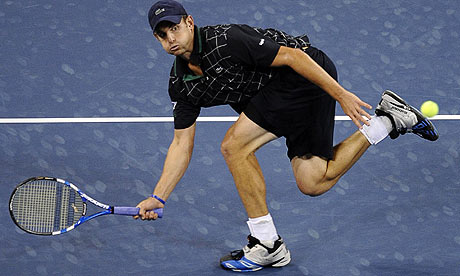 The US Open is the only tournament that seems to play this really late matches. OK, the Australian Open can do that too. Due to a three set win by Venus Williams over Vera Dushevina, a woman that didn’t seem afraid of Williams, Andy Roddick and his opponent, Bjorn Phau, didn’t get on court until 11 PM.
The US Open is the only tournament that seems to play this really late matches. OK, the Australian Open can do that too. Due to a three set win by Venus Williams over Vera Dushevina, a woman that didn’t seem afraid of Williams, Andy Roddick and his opponent, Bjorn Phau, didn’t get on court until 11 PM.
On paper, Roddick should win easily. Phau has a ranking that’s low enough that he often has to qualify for tournaments. He’s now ranked 84, but generally has been ranked in the 100s. His Grand Slam results are a combination of 1st and 2nd round losses and no-shows. Indeed, the US Open is Phau’s first major this year.
Phau is the son of a German father and an Indonesian woman with an apparently Swedish name. If you’ve never heard of a pro that’s playing in a major, you can guess, with high probability, that’s he probably 27 or older. Why is that? The players you hear about: del Potro, Nadal, Djokovic, Murray, all succeeded when they were very young. If you’re 18 coming on tour and you have talent, you typically move into the top 100 very quickly and perhaps into the top 30-40 soon after. If you don’t, you straggle around 100 or 200 or somewhere, and you try to learn more about your craft, and you might, after years of toil, move to a solid ranking in the top 100.
A crafty veteran learns how to win matches, and can beat guys that are new to the tour even if they appear to have some talent. The announcers say Devin Britton, whose only been a pro a few months, has only won one set. That’s it. Here was a guy that won a lot in college and certainly in high school. And this guy, with only one set to his resume, broke Roger several times. Number 1 Roger Federer. Even a no-name has enough game to take a few off the world’s best players.
Phau is 29 years old. He’s been on the tour a while. His big weapons are his backhand and his speed. He’s among the fastest players on the tour. Agassi, who is among the shrewdest observers of the game, dropped by to give his opinion on players, and he said speed is a huge weapon on tour. It allows you to get to shots, get positioned, and hit a good shot. Agassi looked like a good mover, but Sampras observed in his autobiography that Agassi wasn’t all that speedy, and that helped him beat Agassi. Agassi himself admitted that Phau moves a lot faster than he does. Where Phau hits a good shot, Agassi might be hacking at a shot.
Agassi also observed that speed burners tend to go downhill quickly. If they lose a little speed, they often have few other shots to make up for it. If you solely rely on speed, it’s not enough. Agassi credited his longevity in the game to his ability to hit hard on both sides and take the ball early. It let him play credibly with the like of Federer late in his career because, much like Connors, he had weapons that aged well.
Phau just doesn’t have the kind of power that Roddick does, and Roddick, in addition to having power, is still a pretty consistent guy. Roddick knows how to get a few balls in a row over the net. Although Phau said he had played Andy close the last time they met, this is the new Andy Roddick, a guy whose now trying to dictate more from the backcourt, and Phau went down fairly quickly with scores of 6-1, 6-4, 6-2.
By the way, ESPN is showing “Mike and Mike in the Morning”. These two guys talk about sports, primarily, football, basketball, and baseball. They appear to be spending a great deal of time at the US Open, promoting that sport. I believe there is now a concerted effort by Nike, ESPN, etc. to try to get tennis more in the consciousness of sports fans who don’t normally follow tennis. Credit them for trying to do this (historically, they’ve talked about tennis, but end up talking about Roger Federer vs. Tiger Woods, and eventually wandering off to other sports because they don’t watch enough tennis to make intelligent remarks).
Jimmy Connors has joined the Tennis Channel crew often teaming up with Martina Navratilova. He’s a bit odd as a commentator. Credit John McEnroe for doing lots of homework when he started commentary. He knows how the players are playing, their results, etc. Connors appears to have been out of the main sport for a while, despite coaching Andy Roddick a few years ago. Instead of talking about his knowledge of the current game, he’s become the “football commentator” (the guy they used to pair up with tennis experts to give a “common man” perspective) with Martina being the expert. Although Connors knows the game, he knows it from his 1970s/1980s perspective. Even so, it is interesting to hear him ask questions about the weight of racquets and whether today’s players play with too light a racquet and whether players let other people control the weight/balance of their racquet. They’re unusual questions, and Martina seems occasionally thrown by the question, because they are far from typical.
Andy Roddick has an easy win, with a match that finished around 12:30 AM. He told the crowd they were the true fans staying til past midnight to watch the play, and he really felt great about their support, a savvy move by a guy that hasn’t always lived up to the lofty expectations of the American tennis-watching public.



